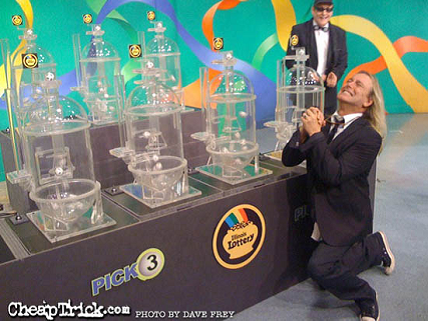Illinois Lottery Now Paying IOUs on Wins Bigger than $600
Just pray these guys never take over the state's whorehouses.

In the Land of Lincoln, it's come to this: Starting today, Illinois will be issuing IOUs for any winning state lottery tickets that pay out more than $600. Back in September, the state had started writing IOUs for wins over $25,000.
Asks the Illinois Policy Institute:
So why is the state continuing to sell lottery tickets? Two winners, one with a winning ticket worth $50,000 and another winner with a ticket worth $250,000, filed a lawsuit Sept. 9 seeking to stop Illinois from selling tickets for winnings it can't pay out.
Regardless of the lawsuit, opines the good folks at IPI, the state should stop laying bets it can't pay. The trouble stems from the awful, worst-in-the-nation budget situation:
The Illinois General Assembly did pass a state budget in May, but it was unbalanced to the tune of $4 billion, and the governor vetoed it. Gov. Bruce Rauner has signed legislation that funds Illinois schools, and many other state spending items have been mandated by consent decrees or pushed piecemeal through the courts.
But Illinoisans across the state continue to suffer as many in the General Assembly refuse to do the right thing and pass a balanced budget the state can afford, instead of resorting to deficit spending. With more than $100 billion in pension debt and $6 billion in unpaid bills, more of the same won't work. It's time to stop the bleeding. Until then, people wanting to cash in life-changing lottery tickets, the poor and disabled, and taxpayers across the state will lose out.
Hat tip: Mike Hewlett.
Amidst not-actually-true stories about how "unregulated" (read: regulated) sports-fantasy sites are ripping off customers, it's good to know that public betting operations are on the cutting edge of brazen theft when it comes to gambling. The obvious solution is to legalize gambling, thus spurring competition for patrons and innovation in offerings. In an age of Yelp for everything, bad actors are unmasked quicker than ever. Which kind of answers the question of why states won't legalize competition.
Consider this snippet from a 1997 story about legal versus illegal numbers games in Philadelphia:
The illegal street game remains appealing despite the state lottery, say Morris, Lane and their buddies, because the payout is greater. The legal Daily Number pays winners $500 for every $1 wagered. Illegal games generally pay $600 for every $1 bet. Bookies also will often extend credit.


Show Comments (26)